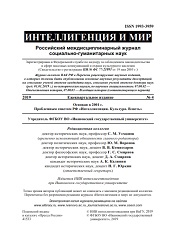Средневековые муниципальные чиновники как тип управленческой протоинтеллигенции (На примере Англии XIV—XV вв.)
Medieval municipal officials as a type of administrative protointelligensia (On the example of England of the 14th — 15th centuries)
Author(s): Marina Aleksandrovna GusevaSubject(s): Public Administration, History of Education, Social development, 13th to 14th Centuries, 15th Century, Human Resources in Economy, Sociology of Education
Published by: Ивановский государственный университет
Keywords: medieval town; officials; protointelligentsia; mechanism of formation; selection criterion;
Summary/Abstract: In its development, the intelligentsia has come a long way in formation. However, at all times, the presence of education, the close connection of activity with intellectual work, as well as moral behavior and the ability to bear responsibility for one's decisions were significant characteristics of it. The mentioned characteristics in our opinion allow considering the category of medieval municipal officials as a certain type of protointelligentsia. The article describes the main officials of the English town of the 14th — 15th centuries, shows the mechanisms of formation of the local administrative apparatus, the selection criteria for its members. Separately, we note that in the history of England of the 14th — 15th centuries — this is the time of the formation of municipal self-government, the definition of its structure. The study showed that in the mentioned centuries the English municipal servants were a rather closed community. This was facilitated both by the requirements of local legislation, which presented their criteria for candidates for municipal posts, and the limited circle of people with the status of a full-fledged citizen. In particular, the applicant for a municipal post was required: financial solvency, a certain education, the ability to bear responsibility for the decisions made, and decent behavior of both the official and his relatives. The professional affiliation of the applicant was also taken into account here. Separately, we note that in the study period, the concept of «a municipal official» did not mean his main professional occupation. These were full-fledged citizens elected to the magistrate for a fixed term. They did not interrupt their craft or trading activities.
Journal: Интеллигенция и мир
- Issue Year: 2019
- Issue No: 4
- Page Range: 31-38
- Page Count: 8
- Language: Russian

